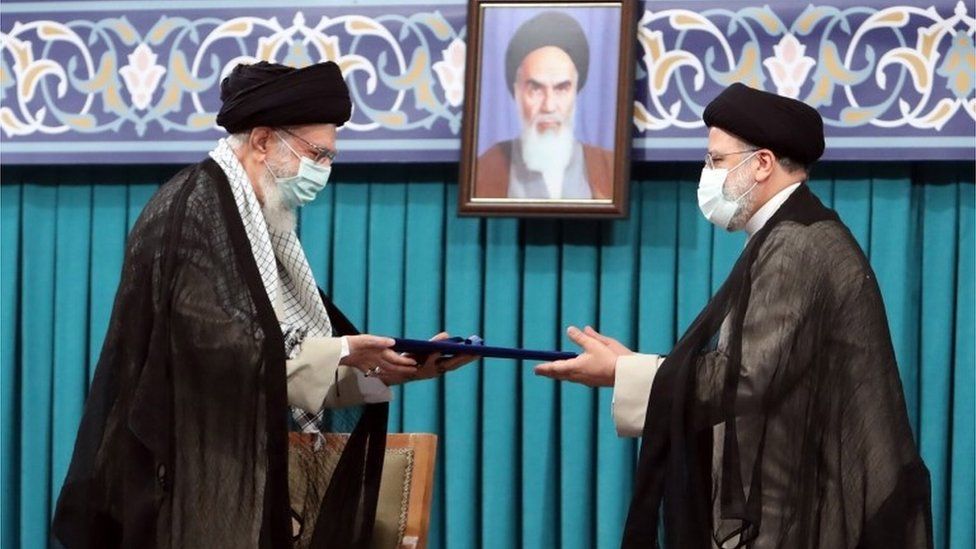Hard-line Iranian President Ebrahim Raisi was sworn into office in early August last year after the Guardian Council disqualified many candidates from standing in the preceding presidential election in order to secure his victory.
After a year in office, it has become evident that Raisi is most likely the cleric who has been hand-picked by the regime to be the next supreme leader of the Islamic Republic. Current Supreme Leader Ali Khamenei is known for criticizing and blaming presidents in order to evade accountability and responsibility, but he has instead been praising Raisi for his performance.
For example, Khamenei in April remarked that the efforts of the Raisi administration were “faithful and diligent” and that the talks over a new nuclear deal were “going ahead properly.” And before Raisi became president, Khamenei told the head of the judiciary and other officials that he had “revived the people’s hope for the judiciary, and this matter is a great social wealth for the country.”
When it comes to Iran’s regional policies, one of the promises that Raisi made during his presidential election campaign was to improve relations with Tehran’s neighbors, including the Gulf states. However, in the last year, the Islamic Revolutionary Guard Corps and its elite Quds Force branch have escalated Iran’s military adventurism in the region. For example, the theocratic establishment continues to be a key supporter and sponsor of the Houthis and it has been increasing its weapons supply to the group. The sophisticated drones and missiles that the Houthis have used to target Saudi Arabia and the UAE most likely came from the Iranian regime, which recognizes the terror group as the official government of Yemen.
Iran’s terror cells have also become more active, particularly in Turkey, under Raisi’s administration. In addition, the IRGC continues to exploit Iraq in order to achieve its revolutionary ideals and hegemonic ambitions. And the Quds Force and IRGC are still using Syria as a proxy battleground in an attempt to score victories against Israel and expand the Islamic Republic’s military stranglehold in the Levant.
When it comes to the domestic situation, Raisi pledged that his administration would support the underprivileged, eliminate absolute poverty and construct 1 million homes. But after a year in office, living expenses have skyrocketed. His administration has also cut subsidies, sparking protests and chants such as “Death to Raisi” and “Death to Khamenei” in many cities across the country.
Rising inflation and poverty have made the Iranian people’s distrust of the Islamic Republic reach a new high. Inflation in Iran has reached more than 40 percent, one of the highest rates in the world.
The state-controlled newspaper Shargh revealed that “reports from the Ministry of Labor show that about 60 percent of Iranians do not have sufficient income and suitable jobs.” It added: “About one-fifth of Iranians are taxi drivers. About 35 to 40 percent of Iranians are tenants and about 20 million are slum dwellers, which means about 25 percent of the population are slum dwellers and homeless.”
State corruption is also at an all-time high and, to make matters worse, the regime is not easing its astronomical expenditure on its nuclear, ballistic missile and drone projects.
Rising inflation and poverty have made the Iranian people’s distrust of the Islamic Republic reach a new high.
Dr. Majid Rafizadeh
During his presidency, there have been mounting calls for Raisi’s international prosecution. The current president was reportedly one of the four members of the so-called death commission that in 1988 ordered the execution of more than 30,000 political opponents, the majority of whom were members of the main oppositional group, the National Council of Resistance of Iran. The UN investigator on human rights in Iran, Javaid Rehman, has on several occasions called for an international inquiry into Raisi’s role in the heinous massacre. The killings have been characterized as a crime against humanity and even genocide by respected human rights experts and lawyers.
After a year of Raisi’s presidency, the Iranian economy has further deteriorated and the people’s distrust of the regime has escalated, while Tehran has ratcheted up its military adventurism and destructive behavior in the region.
By: Dr. Majid Rafizadeh – a Harvard-educated Iranian-American political scientist. Twitter: @Dr_Rafizadeh
Source: Arab News



